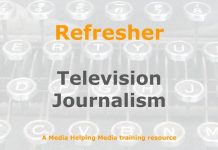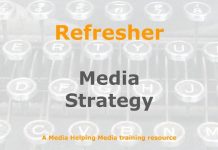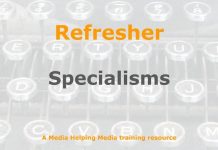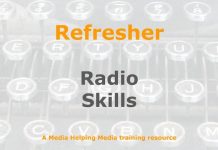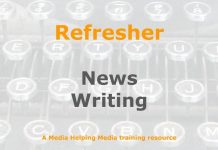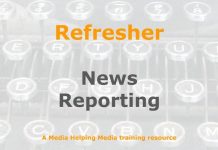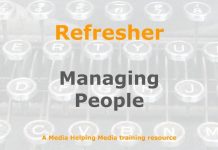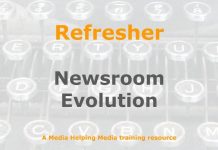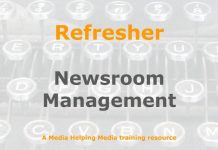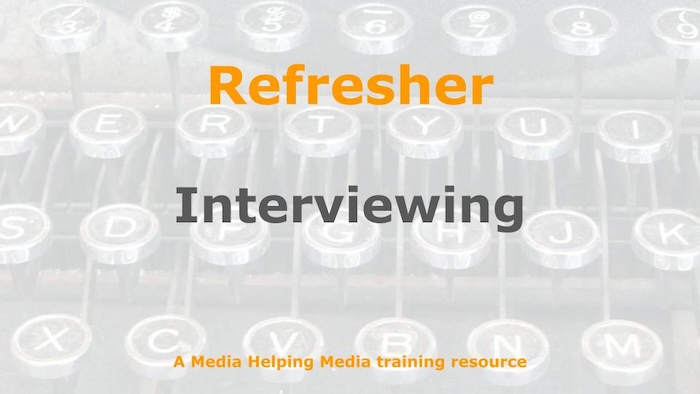 This intensive day-long course offers a refresher on how journalists should carry out an interview in order to gather maximum information and clarity.
This intensive day-long course offers a refresher on how journalists should carry out an interview in order to gather maximum information and clarity.
This refresher is based on the six-week module on interviewing which you are free to download, adapt, and use.
Participants will be trained in a wide spectrum of interview techniques, ranging from quick-fire news gathering to sensitive and adversarial long-form interviews. The day combines practical role-playing with essential ethical training to ensure participants become competent, confident, and sensitive interviewers.
We recommend that trainers circulate the recommended reading resources listed below and encourage participants to read them before attending this refresher.
Learning objectives
By the end of this intensive programme, participants will be able to:
- Understand the basic principles and purposes of different interview types in news and current affairs.
- Master effective preparation and technical considerations (body language, setting, tone) for conducting any interview.
- Apply specialist interview formats, including adversarial styles and interviewing without questions.
- Identify and mitigate ethical risks, personal bias, and conflicts of interest when handling sources.
- Analyse interviewee motivations and safely manage interviews with vulnerable or powerful figures.
Programme schedule
The day is structured into four core sessions, with designated times for breaks.
1: Foundations, preparation, and techniques
- Time: 09:00–10:30
- Focus: Understanding the purpose of an interview, the six questions every journalist should ask, pre-interview research, planning, and managing interview settings (in-person, video, phone).
- Group activity: Practice developing a research plan and a six-question structure for a complex local government interview.
- Core reading:
Break: 10:30–10:45
2: Interview formats and styles
- Time: 10:45–12:30
- Focus: Exploring different styles (breaking news, adversarial, sensitive, vox pop), tactics for dealing with evasive or hostile subjects, and using calls-to-action instead of direct questions.
- Group activity: Role-play an adversarial interview with an evasive subject, focusing on non-question tactics.
- Core reading:
Lunch:12:30–13:30
3: Ethics, bias, and power dynamics
- Time: 13:30–15:30
- Focus: Ethical responsibilities (fairness, transparency, consent), recognising and mitigating unconscious bias, managing conflicts of interest, and analysing interviewee motivations and power dynamics (vulnerable or powerful sources).
- Group activity: Review case studies involving vulnerable sources and draft an ethical consent form and reporting protocol.
- Core reading:
Break: 15:30–15:45
4: Investigative mindset and final practice
- Time: 15:45–17:00
- Focus: Applying advanced interviewing skills within an investigative mindset (extracting truth from complexity, follow-up, cross-checking), safety, and persistence.
- Group activity: Conduct a final round-robin interview, applying investigative follow-up questions to uncover hidden details.
- Core reading:
- The mindset for investigative journalism
- Protecting the integrity of an interview (Inferred core reading)
Concluding summary and discussion (17:00 – 17:30)
Successful interviewing is a careful balancing act between thorough preparation and empathetic responsiveness. This programme reinforces that the craft of interviewing relies on a combination of technical skill, curiosity, ethical rigour, and respect for all sources, enabling journalists to extract truth with professionalism and integrity.
Encourage participants to share what they have learnt from the session.
Related material
